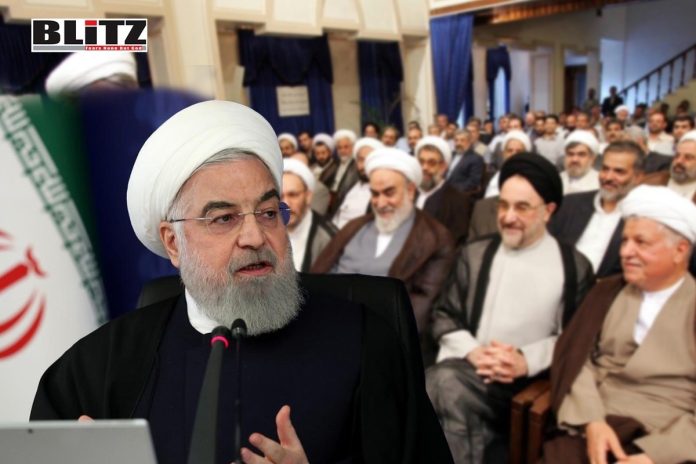Iranian Former President Hassan Rouhani’s recent validation of former Foreign Minister Javad Zarif’s crucial assertions has reverberated across Iran’s political sphere. Their disclosures have illuminated a complex web of systemic dysfunction within the country’s governing structures, prompting profound scrutiny of its constitutional and legal frameworks. This revelation has ignited a significant debate, challenging longstanding assumptions about Iran’s governance and institutional integrity. Rouhani’s acknowledgment underscores the gravity of the issues at hand, signaling a pivotal moment in Iran’s political narrative and prompting urgent calls for reform and transparency.
Rouhani’s validation of Zarif’s contentious tome, “The Depth of Patience,” marks a watershed moment in Iran’s political saga. Embedded within its narrative are poignant insights into the decision-making dynamics post the January 2020 assassination of Quds Force commander Qassem Soleimani. Of particular note, Rouhani echoed Zarif’s disclosures, underlining the glaring lack of consultation with either figure before the consequential retaliatory strike on America’s Ain Al-Asad base in Iraq. This pivotal revelation underscores the opaque nature of Iran’s decision-making processes, amplifying calls for greater transparency and accountability within the nation’s governance framework.
The former president’s disclosure of his unawareness of the strike until the morning of its occurrence underscores a glaring breakdown in communication within Iran’s highest echelons of power. Moreover, Rouhani’s assertion of Iran’s advance notification to the Trump administration about the impending strike signals a calculated attempt to avert further escalation, contradicting previous denials by Iranian officials.
However, Rouhani’s disclosures extend beyond the surface. He delves deeper, exposing another layer of institutional oversight by revealing his exclusion from the decision to close Iran’s airspace on the tragic night of the Ukrainian passenger plane’s mistaken downing by the Revolutionary Guards. This revelation starkly juxtaposes with his constitutional duty as the president of the Supreme National Security Council, laying bare a systemic breakdown in governance. The glaring discrepancy highlights a fundamental flaw in Iran’s decision-making apparatus, emphasizing the urgent need for structural reforms to uphold accountability and prevent similar tragedies in the future.
In response to attempts by the Iranian regime to diminish the significance of these revelations, Rouhani’s team has staunchly defended their position. His official website has issued firm rebuttals against accusations of negligence, vehemently denying claims that Rouhani was asleep during the attacks, which were insinuated by media outlets aligned with the regime. This robust response underscores the imperative of addressing the systemic deficiencies that allowed such oversights to occur, emphasizing the need for transparency and accountability within Iran’s governance framework.
The validation of Zarif’s and Rouhani’s assertions serves as a stark exposé of the intricate power struggles that plague Iranian government institutions. The supreme leader’s pervasive influence, often in collaboration with the Revolutionary Guards, has created a tangled web of decision-making complexities. This dynamic undermines the effectiveness of elected institutions and erodes public trust in the governance system. The revelations underscore the urgent need for structural reforms to untangle this web of influence and restore accountability to Iran’s political landscape.
Furthermore, Rouhani’s revelations have incited a surge of discontent among reformists and various segments of Iranian society disenchanted with the escalating influence of the supreme leader. The sidelining of elected institutions and the strategic manipulation of constitutional mechanisms by hardline factions have only intensified internal economic and social turmoil. This exacerbation fuels growing apprehensions of widespread unrest brewing within the nation. The increasing disillusionment among reformists and the broader populace underscores the urgent need for structural reforms to address the systemic imbalances and restore faith in Iran’s political processes. Failure to heed these calls may precipitate a deeper crisis, jeopardizing the stability and legitimacy of the regime.
As Iran confronts the fallout from Rouhani’s disclosures, the urgent need for reform and transparency in its governance structures becomes abundantly clear. Neglecting to rectify the systemic deficiencies exposed by these revelations could further exacerbate instability and disillusionment among the populace. Such a scenario presents a significant challenge to the regime’s legitimacy and overall stability. Thus, prioritizing structural reforms is imperative to address these underlying issues and restore public trust in Iran’s governance.
As Iran stands at the precipice of uncertainty, it finds itself at a pivotal crossroads. The decisions it undertakes in response to the governance crisis unearthed by Rouhani’s disclosures will sculpt its path for years to come. Will Iran opt for a transformative embrace of reform and transparency, or will it reinforce entrenched power dynamics, potentially escalating unrest and instability? The resolution to this pivotal question carries profound ramifications, not only for Iran’s internal trajectory but also for the broader geopolitical landscape. The choices made in this critical juncture will reverberate far beyond Iran’s borders, shaping regional dynamics and global perceptions of the nation’s governance.



